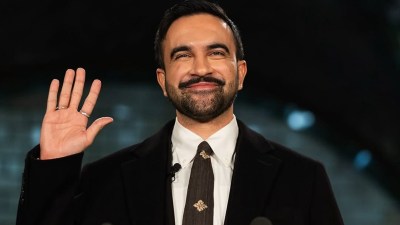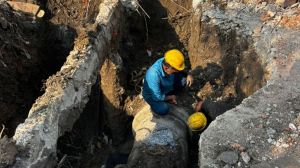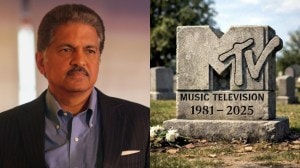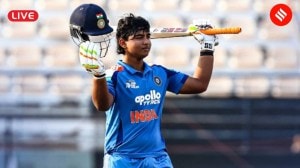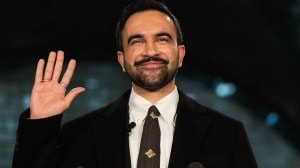Faction replay in Bihar
Early in the cricket world cup of 1992, England played Pakistan at Adelaide. Batting first, Pakistan was bowled out for 74. At 24 for one af...

Early in the cricket world cup of 1992, England played Pakistan at Adelaide. Batting first, Pakistan was bowled out for 74. At 24 for one after eight overs, England was cruising home and Pakistan on its way home. Then the rains came, and never stopped.
The rest of the game was washed out. From certain defeat, Pakistan escaped with shared points. That one point took them to the semi-final and, finally, victory.
One doesn8217;t know how the coming winter8217;s election in Bihar will turn out. Even so, for the moment Laloo Yadav must be just as smug as the Pakistani team that day in Adelaide. His defeat in the February 2005 election has been neutralised. He8217;s delivered democracy8217;s killer application: my wife or me, or no government at all.
The UPA government8217;s decision to dissolve the Bihar assembly came after an extended weekend of low politics and high drama. The NDA seemed to have drawn away enough LJP MLAs to stake a claim. If the governor had dithered, another week of Jharkhand-style theatre 8212; to be suitably covered by television camerapersons running hither and thither 8212; was guaranteed.
It8217;s a pity some of the best stories never made it to prime time. The BJP-JDU had a plane ready in Delhi, to fly allied MLAs to Panchmarhi, Madhya Pradesh. More bizarre was the case of three LJP MLAs whom Ram Vilas Paswan spirited away to Delhi. They were sequestered in Hotel Janpath.
Eventually, the politico husband of one the MLAs arrived in Delhi to 8216;8216;rescue8217;8217; his wife. The plot was hatched. The couple would stay the night at the hotel, and leave early for a morning walk, while the 8216;8216;guards8217;8217; in the lobby were snoozing. The NDA car would be waiting outside.
At 5.30 am, a set of cars went whizzing up and down Janpath, waiting for their quarry. Ms MLA and Spouse never showed up 8212; they had overslept, too dead to the world to even answer frantic calls! It was a wasted effort 8212; much as the election that has now been erased from Bihar8217;s history.
Overall, the NDA is fairly happy. Nitish Kumar had anyway indicated the pitfalls of running a government supported by wild mafioso-MLAs. With Paswan now back to being a one-man party and so less able to play spoiler, BJP-JDU strategists calculate a direct fight with Laloo will help them. The upper caste/ anti-Laloo vote that Paswan and the Congress attracted should gravitate towards the NDA. A consolidation of Muslims and vast chunks of Yadavs and Dalits behind Laloo can be expected. The Congress and Left will be reduced to support cast bereft of any larger ambitions, making Laloo that much more autonomous in the UPA.
The next point of contention 8212; for the prime minister, point of surrender 8212; will probably come in mid-June. That8217;s when the Patna High Court is due to rule on the validity of permission given by an earlier Bihar governor to prosecute Laloo.
What happens if the governor8217;s order is upheld? The matter then moves to the sessions court that has been trying Laloo in a 8216;8216;disproportionate assets8217;8217; case. Arguments have concluded, the judgement has been reserved, pending the high court8217;s nod. It is quite probable the sessions court will deem Laloo guilty and convict him for corruption.
No wonder the man didn8217;t want a hostile government in Patna at this juncture. As for the Congress, it8217;ll have to find a new argument to keep convicted politicians in the Union cabinet.
There is a second, larger conundrum. Impossibly hung assemblies can no longer be wished away. Bihar in 2005 was one example. Karnataka, where a midterm poll is expected, is candidate for a three-way gridlock. Uttar Pradesh actually experienced one in 2002. The new assembly was kept in abeyance till, months later, the BSP and BJP did a deal.
There is a euphemism for this: letting the political process take its course. The NDA says Buta Singh didn8217;t let this happen in Bihar. Yet, can there not be a quicker, more orderly system? It would be futile to look for precedents only within the narrow confines of the Westminster model.
In 1998, with two contenders claiming a majority, the Supreme Court asked the Uttar Pradesh assembly to elect its leader. The winner, Kalyan Singh, as it happened, was sworn in as chief minister.
Strictly speaking that was an ad hoc ruling, not quite constitutional. Yet it could be useful to institutionalise the coalescing of allies around an agreeable leader, even if they have trouble with his party: in 1998, the TDP found it easier to tie up with the BJP because of Vajpayee8217;s personality.
The counter-argument is this could weaken the party system, even though most regional parties are anyhow one-man shows. Whatever the verdict, an innovative yet proper mechanism has to be devised. Cricket matches can be replayed, elections should not be.
- 01
- 02
- 03
- 04
- 05


